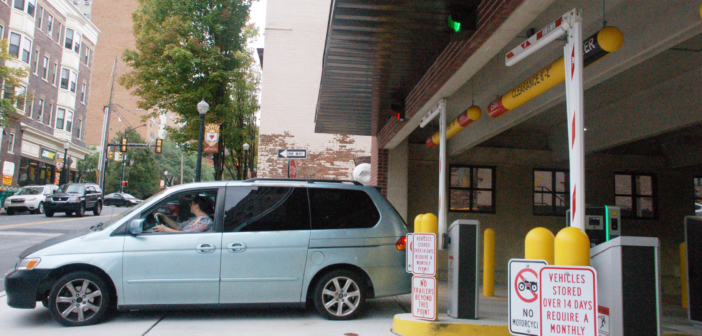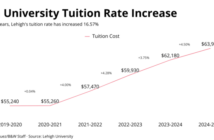The new “Connections” parking and transportation plan proposes to spread faculty and staff parking across the Asa Packer, Mountaintop and Goodman campuses and enhance the campus transportation system.
The plan was presented by Brent Stringfellow, an associate vice president of facilities and university architect, and Mark Ironside, the executive director of University Business Services, at the Sept. 7 Faculty Senate meeting. The plan was shared with all staff via email on Sept. 10.
Under the Connections plan, the price of a permit is determined by parking location. Permits for all Asa Packer and South Side campus parking zones will cost $500 per year. Parking on Mountaintop campus, Upper Residential, 125 Goodman, 126 Goodman, Goodman Lot E and Saucon Village Day Care will cost faculty and staff $250 per year. Parking in the Goodman campus and Northside commuter lots will be free.
The plan attempts to compensate for this increased cost with a $250 salary increase for all faculty and staff on July 1, 2019, when the plan goes into effect.
The location-based parking selection process will begin on or around April 1, 2019, the plan states.
With parking dispersed across three campuses, the university will implement a new transit schedule and will increase the number of Campus Connector buses from three to five vehicles. The buses will also stop more frequently, as the Connections plan states that the average time between Campus Connectors during peak hours will improve from approximately 20 minutes to 10 minutes.
The plan also introduces AccessLU, a new bus service for faculty and staff with accessibility limitations, which will operate from 7 a.m. to 10 p.m. Monday through Friday and from 10 a.m. to 10 p.m. on the weekend.
Breena Holland, a professor of political science, said her primary concern with the new plan is tied to salary.
“The new plan proposes three different tiers of parking price,” she said. “It costs everybody the same to get into tiers, which raises huge equity problems. The (new plan) creates a class-based parking system.”
Al Wurth, a professor of political science, agrees that Connections proposes a regressive setup. He said the monetization of the plan creates a situation in which the people who make the most money get the most benefit, and those who make the least money get the least benefit.
Current permit fees are based on faculty and staff annual salary as budgeted for the fiscal year. Even faculty and staff members in the highest salary tier only pay $96 annually.
Holland said another problem with the plan is increased use of the New Street garage. She said the plan will include securing additional spaces in the garage, which is currently underutilized and unpopular because studies showed it wasn’t a necessary addition to the community.
“Construction of the New Street garage was funded by taxpayer-backed general obligation bonds,” she said. “The university should be putting money into the construction costs of that garage if it is going to be such as a significant user of it.”
Douglas Mahony, a professor of management and the chair of the Faculty Senate executive committee, said it is important to understand the different circumstances that faculty and staff find sensitive and significant. He said faculty with young children or elderly parents, for example, might be concerned about the new plan.
“It’s not just about the convenience of having your car close by,” he said. “It’s about needing access to your vehicle in rapid time on those rare and unfortunate instances when we need to leave quickly.”
Connections is influenced by information gathered from over 70 feedback sessions with different faculty and staff from departmental, special interest and student groups across campus, the plan states.
Lori Friedman, the director of media relations in the Office of Communications and Public Affairs, said in an email that Ironside and Transportation and Parking Services have worked with the Faculty Senate executive committee and the Employee Relations Advisory Committee, ERAC, to listen to and, when possible, address concerns about the new plan.
She said a change has already been made to Connections. Following the presentation to ERAC, staff requested that the transit system start at 6:30 a.m. instead of 7 a.m., a detail that will be amended in the plan.
Mahony said Faculty Senate will be the conduit for information between the faculty constituents and the administration. Faculty Senate has acted as a form of governance for campus faculty since July 1, 2018.
Mahony, who led a committee to implement the Senate, said creating a faculty senate group had been an ongoing challenge at Lehigh. Up until July, governance took form in low-attendance faculty meetings in which each faculty member had one vote.
Mahony said prior to his work on Faculty Senate and his career at Lehigh, he had been a part of several university campuses and he found that parking is a concern everywhere.
“It’s easy to dismiss it as faculty complaining about parking, because that’s something we do all the time,” Mahony said. “But at the same time, underlying those complaints are real concerns.”
Starting Oct. 3, Facilities Services, Campus Planning and Projects and Transportation and Parking Services will host four “lunch and learn” informational sessions about the Connections plan.
Friedman said in an email that another four or five presentations for faculty and staff will be held this spring.
“I like the idea of an interconnected campus that Lehigh is trying to achieve,” Mahony said. “I hope that when the new parking plan is implemented that there is enough flexibility to meet the needs of individuals with unique circumstances.”






Comment policy
Comments posted to The Brown and White website are reviewed by a moderator before being approved. Incendiary speech or harassing language, including comments targeted at individuals, may be deemed unacceptable and not published. Spam and other soliciting will also be declined.
The Brown and White also reserves the right to not publish entirely anonymous comments.
1 Comment
Professors learn about the real world – services cost according to benefit / utility not according to salary..
and such benefits should be at market prices…maybe some econ courses are needed for the profs.
The parking rates should actually be boosted even higher to encourage ride sharing, bus usage, and biking by the ultra liberal profs who advocate lifestyle changes and high taxes for others.